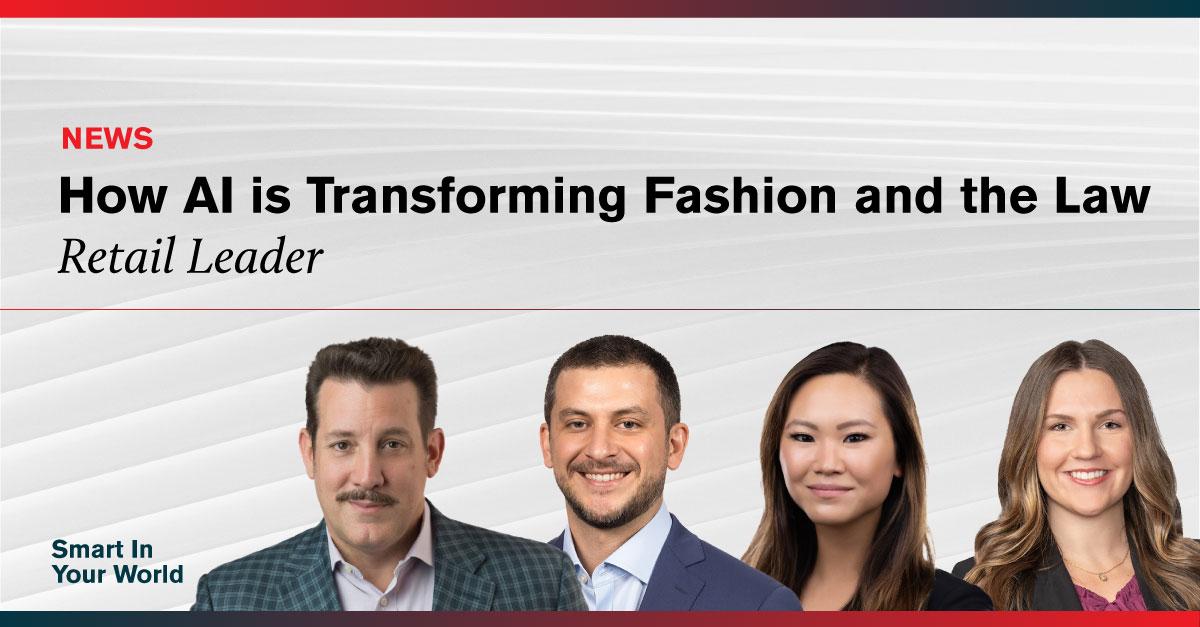The integration of generative artificial intelligence (Gen AI) into the fashion and retail industry is revolutionizing business operations by automating design processes, creating hyper-personalized consumer experiences and managing labor costs. With operating profits expected to be between $150 billion and $275 billion in the coming years, companies must embrace Gen AI to remain competitive, and those that don't risk losing their current market share or going out of business altogether.
While the advantages of Gen AI are true, it is essential to understand the new legal implications raised by its use. Courts are currently in the process of determining how to apply existing laws to address issues of infringement and rights of use, ownership of generation AI creations, and the use of unlicensed content in training data. Various applications of Gen AI in the fashion and retail landscape highlight the associated legal risks.
Use of Gen AI in the design process
Generative design is a key aspect of AI in the fashion and retail industry, allowing designers to generate variations of existing designs or combine elements of previous designs in minutes. The Copyright Office and US courts have determined that content generated solely by AI does not qualify for federal copyright protection due to the lack of human authorship, and no level of human input can lead to a work protectable created by AI.
However, the situation becomes more complex when Gen AI is only a part of the creative process. The copyright office has shown a willingness to grant copyright protection for works created by Gen AI but modified by humans, as long as the new work shows a sufficient amount of original authorship. Determining whether a human-modified Gen AI work meets this criterion will require a case-by-case analysis and likely detailed documentation of the human and Gen AI contributions. There is also no guarantee that a Gen AI tool will not use or reference a protected design. If an AI-generated work is “too close” to the referenced design, it could expose the user of the AI-generated work to infringement claims.
Hyper-personalized marketing at scale
Through proprietary algorithms, machine learning, and data analytics, AI can identify patterns and preferences in consumer behavior, allowing companies to create hyper-personalized marketing campaigns almost instantaneously. To prevent the inadvertent disclosure of trade secrets and other confidential proprietary information, companies should ensure that AI tools comply with their internal data security and confidentiality guidelines, as certain third-party software may retain and use proprietary indications and other data sent by users. Businesses should carefully examine the relevant terms of use, ask about access to tools or features that offer enhanced privacy, security or confidentiality, and consider whether to limit or restrict access to tools that do not meet data privacy or security requirements. retail in the company's networks.
Virtual models and influencers
The use of AI virtual models and influencers in the fashion industry has gained traction as a unique and profitable marketing strategy. These realistic digital models not only display clothes without the need for physical photo shoots or compliance with labor laws, including children's entertainment standards or collective agreements, but can also interact with the public on social media platforms, thus simplifying the process of production and reducing the associated challenges. and expenses
The emergence of virtual AI models and influencers raises legal implications regarding intellectual property rights, privacy, publicity and publicity. As Gen AI models become more and more realistic, the potential for confusion and misappropriation of the likeness of real-life models arises. The issue of copyright ownership for these virtual models also adds complexity, as Gen AI content is not granted copyright protection without human authorship. Marketers must address these legal challenges when considering the use of virtual AI models and influencers in their marketing efforts.
Improving the customer experience
AI capabilities can also be used to enhance the customer experience by providing personalized, seamless and engaging shopping experiences. Innovations include virtual mirrors so customers can try on clothes and accessories virtually, AI-powered chatbots for instant assistance, and AI-powered product recommendation systems that analyze customer preferences, browsing history and behavior of purchase to suggest relevant products.
These AI tools present potential privacy and data protection issues arising from the collection, analysis and storage of personal data. Marketers must ensure compliance with data protection regulations, such as the General Data Protection Regulation (GDPR) and the California Consumer Privacy Act (CCPA), to avoid potential penalties and reputational damage. As businesses continue to embrace AI, they must position themselves to quickly adapt to existing and inevitable changes in the legal landscape.

